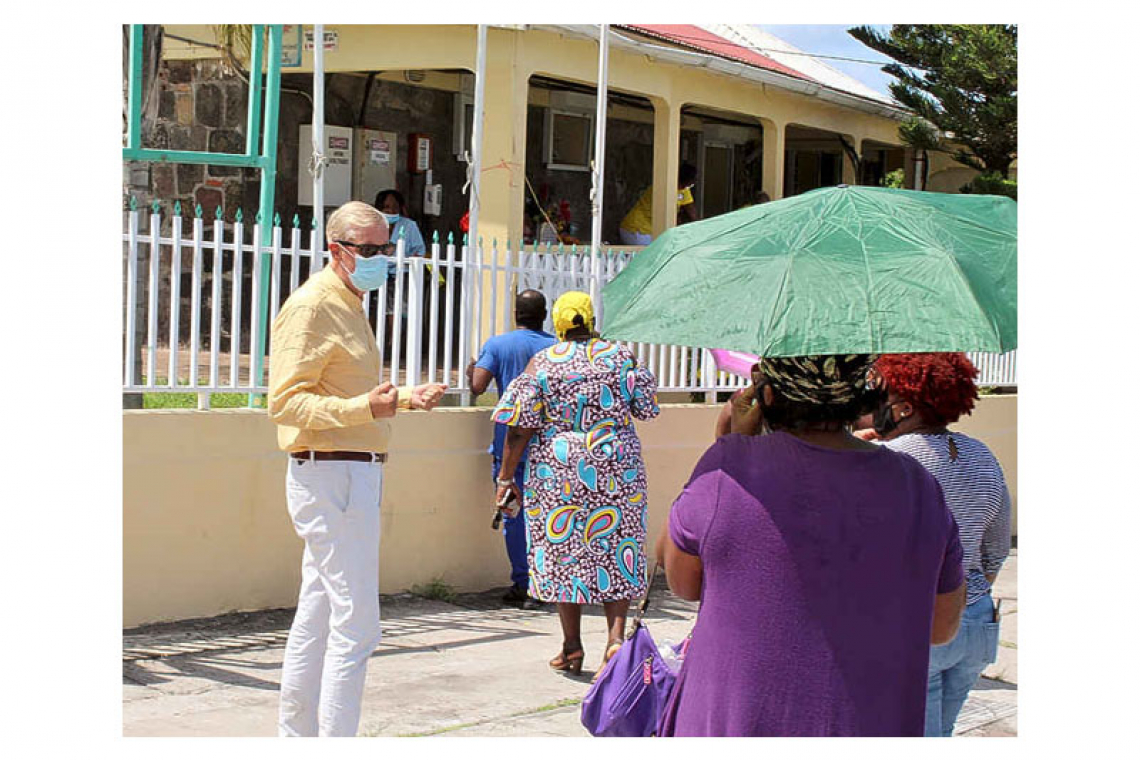Government Commissioner Marnix van Rij (left) speaking to members of the public.
ST. EUSTATIUS--With the fourteenth Emergency Ordinance expiring on Friday, October 16, Government Commissioner Marnix van Rij said the Statia government had held a meeting with the COVID-19 crisis team on Monday and on Wednesday Deputy Government Commissioner Alida Francis met with school leaders based on the situation with the most recent COVID-19 positive case.
Schools on the island are currently on October break. The Public Health Department GGD is currently conducting contact-tracing to find the source of the fourth COVID-19 positive case and to determine the number of persons with whom the positive case came into contact.
Francis said too many people are not adhering to the advice to wear a mask in public places and this type of behaviour will not help the island fight the virus. Government, she added, is not demanding that persons wear masks all day. Government only requests that persons wear masks when in public places.
This request is to avoid having to implement a curfew later on, as this would affect all manner of social life and economic activity.
Government is also appealing to businesses on the island to apply stricter measures, such as insisting that patrons use hand sanitiser and making it mandatory that anyone who enters their premises wear a mask for the safety of clients, staff, themselves and, by extension, the Statia community. Wearing a mask is mandatory at Queen Beatrix Medical Centre, St. Eustatius Auxiliary Home and public offices.
“Life has changed as we know it and we have to change along with it, so that we can all make it through this pandemic together,” Francis said.
The GGD said more COVID-19 testing will be conducted in the coming week. The GGD Director will be on the radio on Thursday evening to share more details about the current COVID-19 situation.
The Auxiliary Home has discontinued the downscaling of measures that allowed persons to visit residents at the home.
Van Rij said some measures were taken in the Second Chamber of the Dutch Parliament, where an act was passed relating to the emergency ordinance COVID-19 law. It has to go before the First Chamber for them to give their opinion and to approve it before it becomes a law.
“This is a very important law for our islands,” said Van Rij. The Public Health Act at the moment states that ordinances can be issued on the islands of Saba and Bonaire by their governors and on Statia by the Government Commissioner. The emergency ordinance is an extraordinary measure which is not supposed to be enacted for long periods. It should also have a good legal basis, which is why the Dutch Parliament started criticising the law and why they are changing the law for the European part of the Netherlands.
If an emergency ordinance is going to be issued by Dutch municipalities, that draft should also be discussed in the Second and First Chambers. Van Rij explained that based on this and if it is a fast procedure, that process should take about two weeks.
The Governors of Saba and Bonaire as well as the Statia Government Commissioner made it clear that this measure is not acceptable to them, as their situation is different from the European part of the Netherlands, Van Rij stated.
“We are isolated islands. We are quite vulnerable with the healthcare system especially on Saba and Statia, and no way we are going to wait for two weeks on whether the Dutch Parliament has an opinion on what we should do here,” Van Rij stated. If this were the case, he explained, the three islands would not be able to operate.
“I made that already very clear and I took the lead in the lobby with The Hague and in the end, with the support of political leaders in Statia, as well as support of the Island Councils of Saba and Bonaire, we have a special provision in the law that we can act faster.”
When the three islands issue an emergency ordinance, they will have to get an assignment from the Minister, which is already based on legal basis in the law. This process, Van Rij explained, would instead take a couple of hours, which would be possible to arrange.
This would all be done after the governors or government commissioner have had consultation on their respective islands with the teams, which they have already been doing for the past couple of months. The three islands will then be able to make decisions based on local circumstances. Van Rij said that this took some time and effort, but they needed to have these discussions fast.







